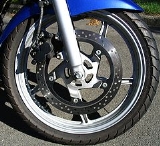
Brake
WordNet
noun
(1) A restraint used to slow or stop a vehicle
(2) An area thickly overgrown usually with one kind of plant
(3) Large coarse fern often several feet high; essentially weed ferns; cosmopolitan
(4) Any of various ferns of the genus Pteris having pinnately compound leaves and including several popular houseplants
verb
(5) Cause to stop by applying the brakes
"Brake the car before you go into a curve"
(6) Stop travelling by applying a brake
"We had to brake suddenly when a chicken crossed the road"
WiktionaryText
Etymology 1
Recorded since c. 1440, from , from (=modern Dutch), applied to many crushing implements, and the ring through the nose of a draught ox. The word was influenced in sense by , a form of bras "an arm, lever or handle", used in English from 1380 and applied to "a bridle or curb" from 1430. One or both took up the main modern meaning of "stopping device for a wheel," first attested 1772.
Noun
- A device used to slow or stop a vehicle, by friction; often installed on the wheels, then often in the plural.
- Something that slows or stops an action
- The handle, manned by up to six men, by which a ship's pump was worked
- A type of machine for bending sheet metal. (See wikipedia.)
- A specific torture instrument
Related terms
- air brake
- antilock brake
- brake band
- brake disc
- brake drum
- brake fluid
- brake harrow
- brake horsepower
- brake lining
- brakeman, brakesman
- brake drum
- brake pad
- brake van
- brake wheel
- brakey
- caliper brake
- disc brake
- emergency brake
- foot brake
- hand brake
- parking brake
- press brake
Verb
- To operate (a) brake(s).
- To be stopped or slowed (as if) by braking.
- To bruise and crush; to knead
- The farmer's son brake the flax while mother brakes the bread dough
- To pulverise with a harrow
Noun
- A fern type, bracken
- A canebreak
- A thicket, or an area overgrown with briers etc.
-
- A barking sound the Shepherd hears,
- A cry as of a Dog or Fox;
- He halts, and searches with his eyes
- Among the scatter'd rocks:
- And now at distance can discern
- A stirring in a brake of fern;
- From which immediately leaps out
- A Dog, and yelping runs about.
-
Verb
brake
-
- Exodus 32:3, KJV:
- And all the people brake off the golden earrings
- Exodus 32:3, KJV:

